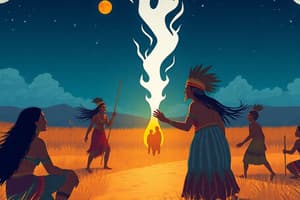Podcast
Questions and Answers
What is a primary method by which powerful actors influence others according to the content?
What is a primary method by which powerful actors influence others according to the content?
- They change others’ beliefs directly.
- They shame others into conformity. (correct)
- They build personal relationships with individuals.
- They create physical barriers to compliance.
What type of power is described as being instrumental and reliant on intersubjective efficacy?
What type of power is described as being instrumental and reliant on intersubjective efficacy?
- Persuasive power.
- Compulsory power.
- Structural power. (correct)
- Informal power.
Which groups are mentioned as having a role in exercising power according to the content?
Which groups are mentioned as having a role in exercising power according to the content?
- Only governmental organizations.
- Individual citizens only.
- Transnational interest groups and NGOs. (correct)
- Local community groups exclusively.
How do powerful actors ensure their policies are effective?
How do powerful actors ensure their policies are effective?
What is suggested as a limitation of power as described in the content?
What is suggested as a limitation of power as described in the content?
What was the Angolan government's stance on cooperating with Namibia regarding the dam project?
What was the Angolan government's stance on cooperating with Namibia regarding the dam project?
What does the term 'ideational power' refer to in the context of transboundary river basins?
What does the term 'ideational power' refer to in the context of transboundary river basins?
Why is the current understanding of ideational power in transboundary river basins considered limiting?
Why is the current understanding of ideational power in transboundary river basins considered limiting?
What does the article suggest is necessary for a comprehensive view of transboundary river governance?
What does the article suggest is necessary for a comprehensive view of transboundary river governance?
What role do interest groups from different countries play in the case of the OvaHimba and the dam construction?
What role do interest groups from different countries play in the case of the OvaHimba and the dam construction?
Flashcards
Structural Power
Structural Power
Actors who try to bring others into alignment with their ideas or norms through social pressure.
Intersubjective Efficacy of Ideas
Intersubjective Efficacy of Ideas
Power that compels conformity without changing beliefs, but rather through the perceived effectiveness of the ideas being pushed.
Traditional Power Levers
Traditional Power Levers
Power exercised through traditional institutions like states and their organizations.
Communicative Discourse
Communicative Discourse
Signup and view all the flashcards
Transnational Interest Groups
Transnational Interest Groups
Signup and view all the flashcards
Ideational Power
Ideational Power
Signup and view all the flashcards
Basin Hegemon
Basin Hegemon
Signup and view all the flashcards
Paradiplomacy
Paradiplomacy
Signup and view all the flashcards
Soft Power
Soft Power
Signup and view all the flashcards
Complex Transboundary River Realities
Complex Transboundary River Realities
Signup and view all the flashcards
Study Notes
Indigenous Paradiplomacy and the Orokawe Hydroelectric Dam
- Indigenous groups lobbied against the Orokawe dam on the Kunene River, a transboundary river shared by Angola and Namibia.
- Bilateral state diplomacy exists regarding the allocation and management of the transboundary water resource.
- Indigenous groups used ideational power in transboundary water diplomacy.
- This involved lobbying, transnational network development, and using the internet to communicate.
- Dam projects often cause displacement, environmental damage, and alter river flow which may create conflicts upstream and downstream.
- Sunk costs, such as expensive technical feasibility studies, can make projects difficult to stop.
- Indigenous groups used documents, such as declarations, to influence the status quo.
- Indigenous paradiplomacy involves non-state actors managing relations among themselves and others in an international context.
- Indigenous paradiplomacy actors used power over ideas (or ideational power) to influence non-state and state actors.
- Indigenous groups used international fora (e.g. UNDRIP).
- The Kunene River basin is geographically and biophysically unique, with a steep gradient and waterfalls.
- The Orokawe dam project was controversial and has been opposed by indigenous groups since the 1990s.
- Indigenous groups used the internet to organize and disseminate information about their cause.
- The Orokawe dam project has been proposed for several decades.
Studying That Suits You
Use AI to generate personalized quizzes and flashcards to suit your learning preferences.




